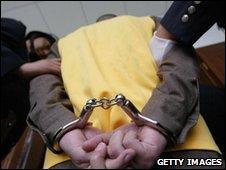China bans evidence from torture
- Published

Police are often accused of brutality
Evidence obtained under torture cannot be used in China's courts, the government has said, weeks after a convicted murderer was set free because his victim turned out to be alive.
Laws banning torture are already in place, but analysts say they are widely disregarded.
Officials were embarrassed by the case of Zhao Zuohai, who spent 11 years in jail for a murder that never happened.
He says he was beaten by police until he confessed.
He was eventually given $96,000 (£67,000) in compensation and two policemen accused of beating him were arrested.
Correspondents say convictions in the Chinese court system are strongly dependent on confessions, motivating police to use force.
'Big progress'
The government issued two new sets of procedures - the first covers evidence in cases subject to the death penalty, and the second rules on evidence obtained under duress in all criminal cases.
For people appealing against the death penalty, testimony given under duress and evidence from unnamed sources is now to be excluded.
Death-penalty defendants have also been given the right to ask for an investigation into whether their testimony was obtained illegally.
The regulations banned any evidence of unclear origin, confessions obtained through torture, or testimony obtained through violence and intimidation.
Legal expert Zhao Bingzhi told the state-run China Daily that it was the first time a "systematic and clear regulation" had been given on the issue.
"Previously we could only infer from abstract laws that illegal evidence is not allowed. But in reality, in many cases, such evidence was considered valid," he said.
"This is big progress, both for the legal system and for better protection of human rights. It will help reduce the number of executions."